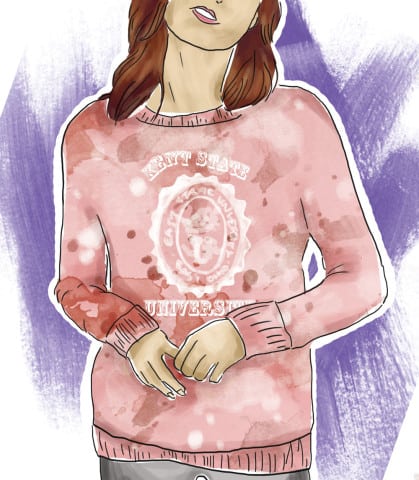PETER PARK
 Recently, clothing retailer Urban Outfitters briefly sold a controversial vintage-style Kent State University sweatshirt with crimson blood-like splatters across the front. The “joke” seems to refer to the 1970 Kent State Massacre and is both controversial and disrespectful.
Recently, clothing retailer Urban Outfitters briefly sold a controversial vintage-style Kent State University sweatshirt with crimson blood-like splatters across the front. The “joke” seems to refer to the 1970 Kent State Massacre and is both controversial and disrespectful.
For those unfamiliar with the incident in question, following Richard Nixon’s announcement of the American invasion of Cambodia during the Vietnam War, Kent State University held an anti-war demonstration in avid protest. The rally ended with rifle-toting members of the Ohio National Guard firing into the crowd, killing four students and wounding nine others.
It seems to me that Urban Outfitters is using this infamous tragedy to their advantage for profit.
Kent State released a statement on the university’s website regarding Urban Outfitters’ allusion to the shooting.
“May 4, 1970, was a watershed moment for the country and especially the Kent State family […] We take great offence to a company using our pain for the publicity and profit. This item is beyond poor taste and trivializes a loss of life that still hurts the Kent State community today.”
Newspaper columnists and social media users alike crucified Urban Outfitters for their insensitivity and ignorance. Following heavy public backlash, Urban Outfitters pulled the sweatshirt from shelves and the online store.
Subsequently, Urban Outfitters issued an apology on Twitter: “Urban Outfitters sincerely apologizes for any offense our Vintage Kent State Sweatshirt may have caused. It was never our intention to allude to the tragic events that took place at Kent State in 1970 and we are extremely saddened that this item was perceived as such.” The post goes on to claim that the red splatters were in fact not intended to represent blood — they were a result of discoloration from the original shade of the sweatshirt.
I don’t buy that for a second. Given Urban Outfitters’ history of controversial clothing, it seems probable that the Kent State sweatshirt was entirely intentional. On multiple occasions — including this one — Urban Outfitters has demonstrated their disregard for political correctness and ethics. This begs the question, is controversy good for business?
A few years ago, a grey v-neck with the words “Eat less” on it was pulled from Urban Outfitters’ shelves and website. The public accused them of condoning and endorsing anorexia, especially because the shirt was advertised on a slender, skin-and-bones-looking model.
Urban Outfitters came under scrutiny once again for their black and white crop top with the word “Depression” printed all over it. The company was berated for glamorizing a serious mental illness and this shirt too had to be withdrawn from shelves due to its negative reception with the public.
In 2004, Urban Outfitters released a “Jewish Girls” t-shirt covered in dollar signs. The joke being that Jewish people are obsessed with money. A year earlier, they sold a board game called “Ghettopoly,” the joke being that poor people are drug addicts and dealers.
Without a doubt, these products are the polar opposite of funny; they can be described as only racially insensitive and rude. They’ve even had a colour combination called “Obama/Black.”
The fact that Urban Outfitters has pulled stunts like this numerous times in the past only points towards how extremely unlikely it is that the sweatshirt, or any of their other products, was unintentionally offensive. It just doesn’t happen like that. The sheer number of controversies that surround Urban Outfitters for their crass, so-called fashion statements make the Kent State sweater 99 per cent likely to be deliberate. Controversy does indeed seem to be good for business.
So what? Do we boycott Urban Outfitters the way actress Sophia Bush did when the “Eat less” shirt was released?
Their tactic definitely failed; the ill-mannered, attention-seeking Urban Outfitters company certainly won’t be getting my money any time soon.
—
Graphic: Stephanie Mah/Graphics Editor
Leave a Reply